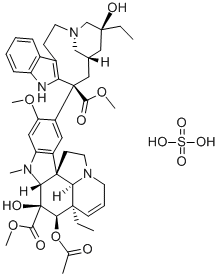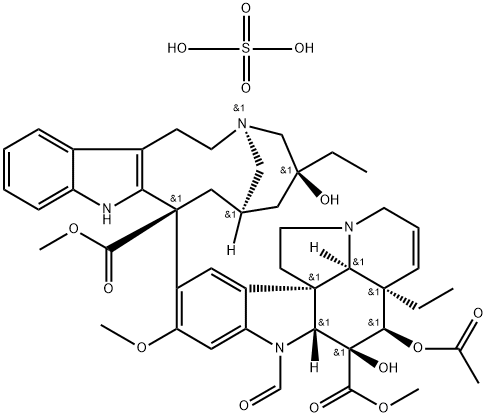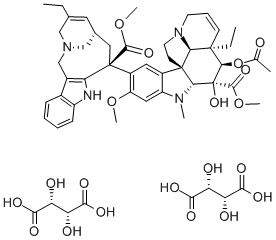Vinblastine sulfate , ≥97%(HPLC) , 143-67-9
Synonym(s):
Vinblastine Sulfate - CAS 143-67-9 - Calbiochem;Vinblastine sulfate salt;Vincaleukoblastine sulfate salt;VLB
CAS NO.:143-67-9
Empirical Formula: C46H60N4O13S
Molecular Weight: 909.05
MDL number: MFCD00082457
EINECS: 205-606-0
| Pack Size | Price | Stock | Quantity |
| 50MG | RMB699.20 | In Stock |
|
| 250MG | RMB2736.00 | In Stock |
|
| others | Enquire |
PRODUCT Properties
| Melting point: | 267 °C (dec.)(lit.) |
| alpha | -21.7 º (c=2, CH3OH 21 ºC) |
| storage temp. | 2-8°C |
| solubility | H2O: 10 mg/mL |
| form | powder |
| color | white |
| PH | 3.5~5.0 (1g/l, 25℃) |
| Water Solubility | >=1 g/100 mL at 24.5 ºC |
| Merck | 13,10044 |
| BRN | 3659812 |
| InChIKey | KDQAABAKXDWYSZ-PNYVAJAMSA-N |
| CAS DataBase Reference | 143-67-9(CAS DataBase Reference) |
| IARC | 3 (Vol. 26, Sup 7) 1987 |
| EPA Substance Registry System | Vinblastine sulfate (143-67-9) |
Description and Uses
Vinblastine sulfate is the salt of an alkaloid extracted from Vinca rosea Linn., a common flowering herb known as the periwinkle (more properly known as Catharanthus roseus G. Don). Previously, the generic name was vincaleukoblastine, abbreviated VLB. It is a stathmokinetic oncolytic agent. When treated in vitro with this preparation, growing cells are arrested in metaphase. Chemical and physical evidence indicate that vinblastine sulfate is a dimeric alkaloid containing both indole and dihydroindole moieties.
Vinblastin sulfate USP (Velban) is used to treat Hodgkin’s disease; lymphosarcoma; reticulum cell sarcoma; neuroblastoma; choriocarcinoma; carcinoma of breast, lung, oral cavity, testis, bladder; acute and chronic leukemia; histiocytosis; mycosis fungoides.
Safety
| Symbol(GHS) |   GHS07,GHS08 |
| Signal word | Warning |
| Hazard statements | H302-H341-H361fd |
| Precautionary statements | P202-P264-P270-P280-P301+P312-P308+P313 |
| Hazard Codes | Xn,T |
| Risk Statements | 22-37/38-41-61-36/37/38-63-23/24/25 |
| Safety Statements | 26-36/39-53-45-37/39-36/37/39 |
| RIDADR | 1544 |
| WGK Germany | 3 |
| RTECS | YY8400000 |
| F | 8-10 |
| HazardClass | 6.1(a) |
| PackingGroup | II |
| HS Code | 29399990 |
| Toxicity | LD50 i.v. in mice: 9.5 mg/kg (Lu, Meistrich) |





